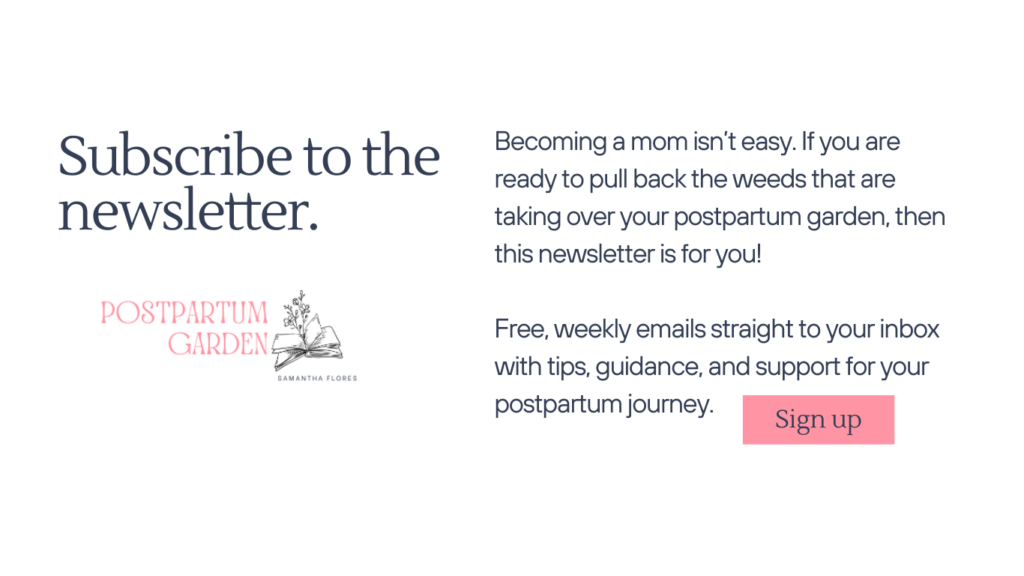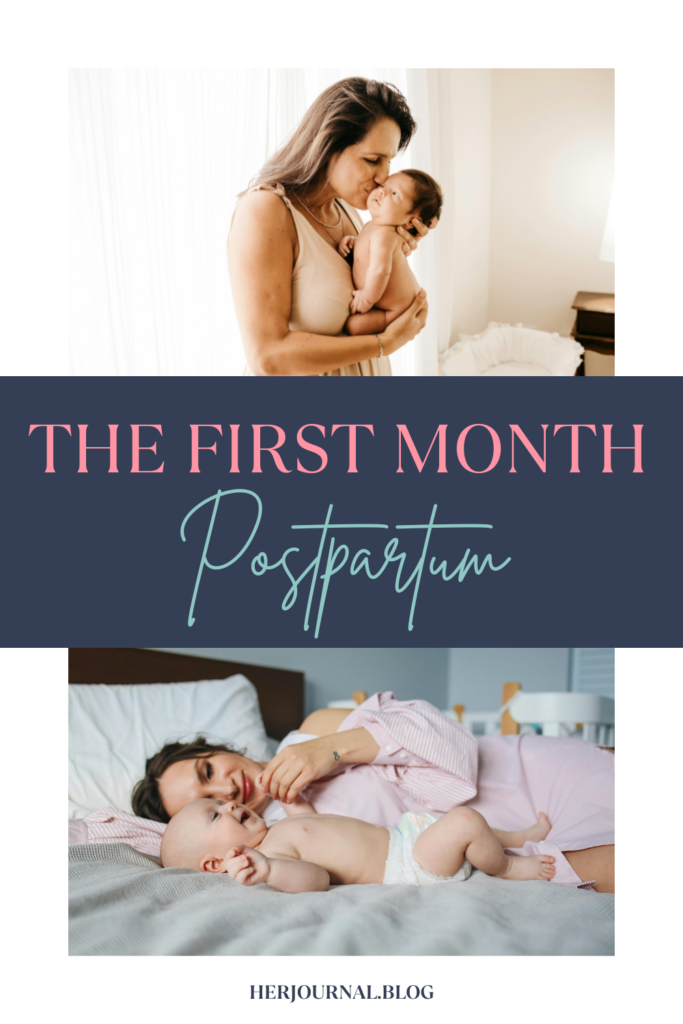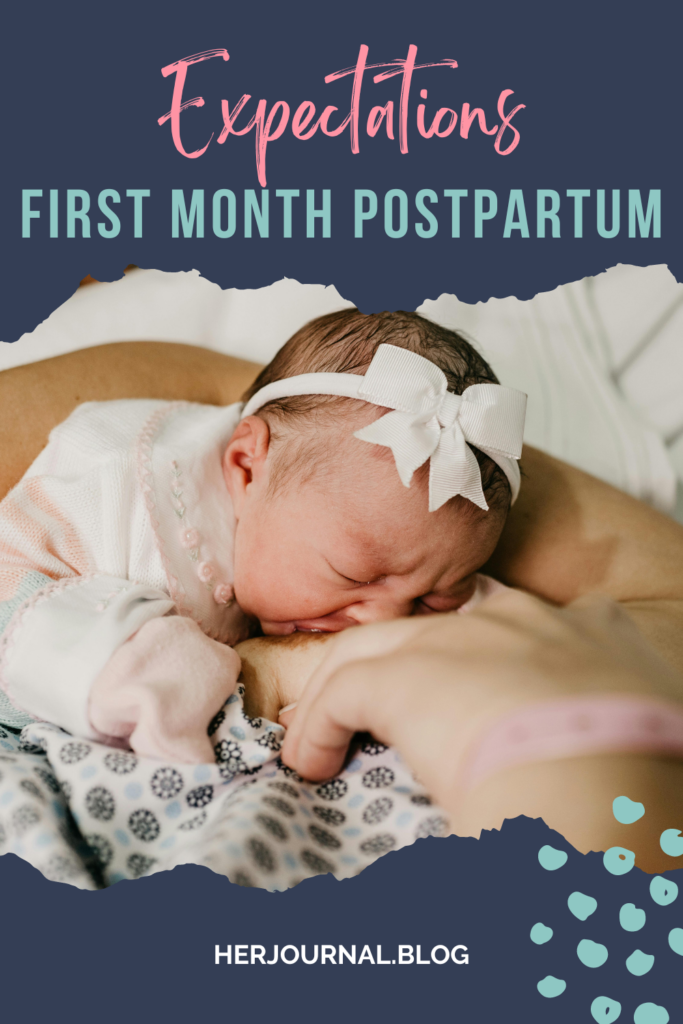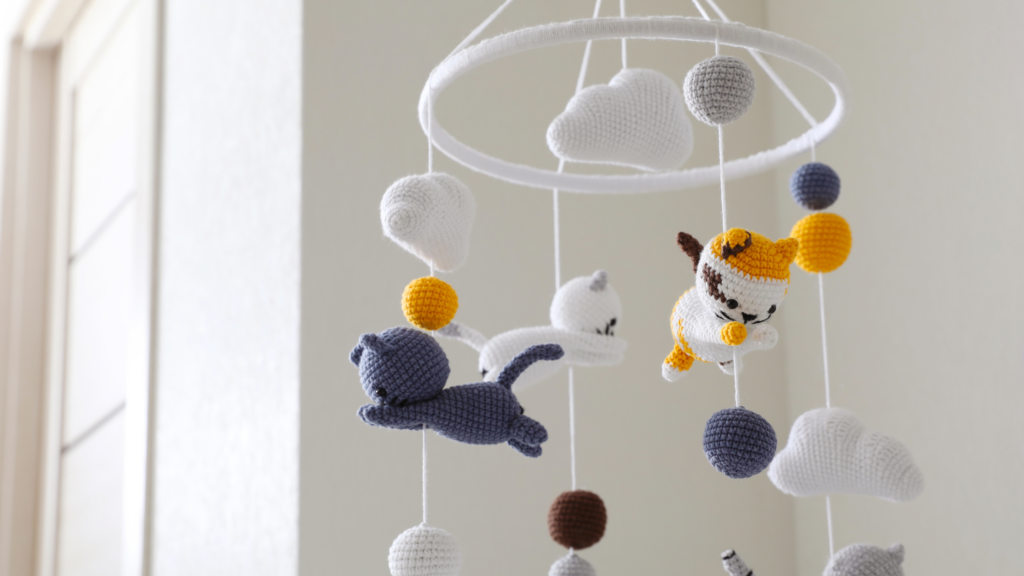We may earn money or products from the companies mentioned in this post.
Last Updated on September 25, 2024 by Samantha Flores
Finally, the wait is over! You have your precious bundle in your arms and now the healing can begin. With the stars still in your eyes and the wonder of how you got through labor and delivery, now it’s time to focus on your recovery. Learn what to expect during the first month postpartum.
Many expecting moms only take the time to learn about pregnancy and birth. Let’s face it, society has taught us to fear giving birth. Obviously, the one thing many women focus on is how terrified they are of going into labor. However, expecting moms need to take the time to learn about what to expect during recovery once they’ve birthed their sweet little one.
As a mother of three, I have learned from many experts along the way and I’ve gained my own insight into what to expect postpartum. It’s my goal to share with you how you can have the best postpartum recovery. This post is the first post in a series dedicated to postpartum expectations each post where I will cover each month of recovering from birth beginning from day one to Baby’s first birthday.
Related: Postpartum Hormone Imbalance: How to Understand Your New Body

What to Expect Postpartum
During the first month postpartum, there are many moving parts physically, mentally, and emotionally. Use the following guide to help understand what to expect.
Week One
Whew, you just had a baby! Congratulations! You just birthed an entire human being and a placenta. Days one through seven are crucial to your healing.
Contractions: On day one, you will experience contractions that are helping to shrink your uterus back down to its pre-pregnancy size. You will still feel somewhat euphoric on day one and in a haze of bliss, exhaustion, disbelief, and many other things. Take it all in.
Days two and three are the most intense for contractions. The contractions typically stop around the end of week one but could linger into the second week.
Bleeding: Your postpartum bleeding will be heaviest during this first week, so take it easy and slow. Follow the 5-5-5 postpartum rule. The bleeding you will experience will be bright red and you may pass some clots. Make sure you stock up on those adult diapers and/or postpartum pads.
Emotions: Days two and three are also the most intense emotionally as your body is experiencing withdrawals from the hormones that have left your body. Days four through seven may have some tears as well, and that’s okay!
Breastfeeding: If you are breastfeeding, this first week will be important to establish your milk supply. Your nipples may take some time to “toughen up” as they get used to being sucked on constantly. Keep your nipple butter on hand to help with any cracked or bleeding nipples that may occur.
Related: Postpartum Body Changes: How to Accept the New You

Week Two
Bleeding: Your body is still incredibly vulnerable during week two. The postpartum blood will have changed color from bright red to light red, potentially with some small clots. It will still be a medium flow during week two but could become heavier if you are active. That is why you want to make sure you are resting so that your bleeding doesn’t become a problem.
After you give birth, there is a dinner plate-sized hole in your abdomen from where the placenta was attached. This needs time to heal. Keep rest in mind as your body works hard to recover.
Breastfeeding: If you are breastfeeding, your nipples are likely feeling better by this point in the first month postpartum. You can still use the nipple butter if you need it. Your milk supply is working to adjust to your baby’s needs. When your baby is latched and nursing, this helps your uterus contract, which will help with the healing. Consider talking to your midwife or a lactation consultant if you are experiencing pain during breastfeeding.
Emotions: “Baby Blues” or “Postpartum Blues” may be feeling very strong at this point. The first couple of weeks after birth are emotional as your body adjusts to the hormone drop.
Nutrients: Continue taking your prenatal vitamins. Consider using a prenatal that will continue to support you postpartum. The key nutrients you need to heal and recover properly are found in NEEDED vitamins. Use code postpartumsam for an exclusive discount and try them out!
(Disclaimer: Always check with your primary care provider before taking any supplements).
Week Three
Bleeding: You are likely still bleeding during week three, but it won’t be as heavy as the prior weeks. During week three in the first month postpartum, you may see your bleeding change from light red to a pink and/or brown color. This indicates old blood is flushing out of your body. You shouldn’t be passing any more clots at this point.
Emotions: Your emotions may feel like they are all over right now. If you don’t feel like your emotions are getting better, or if you feel like they are getting worse, talk to your provider for additional assessment.
Breastfeeding: Breastfeeding should be well established by now and your milk has changed from the rich yellow colostrum to a more milky-white color. Your supply is still adjusting and learning what your baby needs.
Related: Is the 6-week Postpartum Checkup Enough for New Moms?

Week Four
Week four in the first month postpartum is a milestone! You’ve made it a full month after birth. Things start to feel less hazy (although you may be struggling with sleep deprivation). This is around the time when you can start venturing out of your house more as your bleeding is light now.
Bleeding: Some women report that their bleeding has stopped by week four. Keep in mind that you are still vulnerable up until six weeks postpartum. Your bleeding can start again or increase in flow if you become active too quickly. Take it slowly, do small trips out of the house, and rest after you get back home.
Emotions: The tears related to the hormone withdrawal have stopped. However, if you are still experiencing days of tears and sadness, it may be time to consult your provider. There could be underlying issues taking place that may require additional testing, such as postpartum thyroiditis.
Postpartum thyroiditis is linked to postpartum depression. Therefore, it is crucial that you advocate for your health and request additional testing before going on depression medications. It’s important to address the root cause rather than mask the symptoms.
Breastfeeding: Cracked and bleeding nipples should be a thing of the past by now. Many women also begin venturing into pumping at this time since their milk supply has come in and their baby’s latch has been established.
How to Help During the First Month Postpartum
Going on your postpartum journey is all about taking it one day at a time (or one hour at a time). The following suggestions are things I did to help during my first month postpartum.

Keep Hydrated
Hydration is key in your recovery. Your body needs additional electrolytes to continue to heal. In addition, when you are hydrated, the rest of your body can continue to work like it needs to. Hydration also helps with headaches, mood, digestion, and more.
Use NEEDED to support your hydration (and get a discount with code postpartumsam). The NEEDED hydration support offers quality electrolytes that are necessary for healing as well as for lactation. Simply mix the hydration power with 1-2 cups of water and you enjoy!
Increase Protein
Consider how much blood loss you’ve experienced since having your baby. Many new mothers begin to struggle with anemia after having a baby because of the blood loss and not replenishing those levels with iron-rich foods or supplements. This is the time to really focus on increasing iron to help promote a better recovery.
In addition, postpartum depression is linked to anemia. According to the National Institute of Health, iron is a component of neurotransmitters. Iron deficiency can impair brain myelination and monoamine metabolism, which can lead to emotional and psychological problems. Therefore, it’s important to increase your iron during postpartum.
Related: The Fourth Trimester: A Postpartum Depression Guide
Drink Red Raspberry Leaf Tea
During the first month postpartum, red raspberry leaf tea is thought to help shrink the uterus to its pre-pregnancy size and tone. This can help with postpartum hemorrhage. Plus, it’s also a nice treat to relax with.
Red raspberry leaf tea offers additional benefits such as increasing milk production, assisting with hormone regulation after birth, offering potassium, and providing rich vitamins and minerals such as vitamin C, vitamin E, and calcium.
(Disclaimer: Again, always talk to your provider before beginning any new supplements.)

Communicate
You can never over-communicate! This is especially true during postpartum. Even when you don’t understand what you are feeling or what you are thinking, just get it out. Talk with someone you trust and communicate your needs, fears, hopes, struggles, anything and everything.
It is crucial to communicate with your spouse/partner. They are also facing this time of transition with you and they are dealing with their own confusion. This person wants to support you, but oftentimes, doesn’t know how to do that. Encourage communication with them and those in your support system.
Keep a Journal
One of the things I always suggest to new moms is to keep a journal. This journal needs to be something that you can write in (physically or digitally) that helps you keep your mind in check.
If you are struggling, write what you are struggling with. If you are having a good day, write about it and celebrate it. The goal of this journal is to see if there is a trend. For example, are you having more and more bad days? Or are your days becoming less foggy? This will tell you whether you need to be seen for additional assessments, such as a postpartum depression screening.
Related: The Postpartum Period: How to Survive After Birth
Rest, Rest, Rest
You really cannot rest too much during the first month postpartum. Your body has just given life to a human being. That is no easy task! You need to take this time to rest and recover. If you don’t, you are only hurting yourself. Trying to do too much too soon can lead to a setback in your postpartum healing.
Trust me, I have three kids. Taking it easy after my third birth experience while having two older kids seemed impossible. But it was necessary for me and everyone around me. Rally your village, ask for help, and be willing to relinquish control over things so that you can rest.

The First Month Postpartum is a Delicate Time
This is a delicate and vulnerable time. It feels like your insides are on the outside and everything is shifting back to where they belong. The hormones are unbalanced, you’re sleep-deprived, and you likely don’t remember when was the last time you took a shower. That’s okay! All you need to focus on right now is bonding with your baby and healing your body and mind.
This is a crucial time in your motherhood journey. Don’t neglect yourself! Rest, eat well, stay hydrated, and remember that this is only a season. All seasons come and go. You will be recovered soon enough. Slow and steady wins the race.
Related: Is the 6-week Postpartum Checkup Enough for New Moms?
Pin It!





